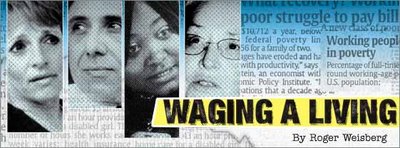Waging a Living

A couple weeks ago, I mentioned a documentary in class that examines the lives of four people struggling to provide for their families while living paycheck to paycheck. While reading the chapter on Housing and Community Development, my thoughts came back to this film and the portraits of these people. The film is called "Waging a Living" and it aired on PBS's P.O.V. series.
I found a few quotes and related questions from the film and wanted to throw them into our discussion this week:
Jean described her frustration in obtaining benefits for her family: “I had gone back and forth to social services asking these people to help, and it just seemed like nobody was hearing me. I went and I explained that I was in dire straits. I needed a place to live. And they told me, ‘Well, this isn't a real estate office.’ And I just looked dumbfounded, I said, ‘You don't understand, I can't afford to live in the house anymore.’”
What are your thoughts when you read about Jean’s plight, and the response of the social workers? What would you advise Jean to do to obtain the help she needed?
"Barbara struggles to balance her responsibilities as a full-time college student, worker, and mother. She makes $8.25 per hour as a counselor at a juvenile detention facility, but her earnings are insufficient to make ends meet. To supplement her wages, Barbara receives a range of government benefits including Medicaid, food stamps, childcare assistance, utility assistance, and subsidized Section 8 housing. Barbara eventually receives a raise to $11 per hour, but her increased earnings make her ineligible for most government benefits. She calculates that by earning an additional $450 a month, she loses almost $600 a month in government aid."
What are your views about Barbara's situation? Particularly, how do you feel about her raise leading to a drastic reduction in her aid?
I'd strongly recommend this film to everyone - you can see a trailer and a few clips on its web site.
Waging a Living Web site

1 Comments:
At 3:00 PM, October 02, 2006, austin said…
austin said…
"Barbara struggles to balance her responsibilities as a full-time college student, worker, and mother. She makes $8.25 per hour as a counselor at a juvenile detention facility, but her earnings are insufficient to make ends meet. To supplement her wages, Barbara receives a range of government benefits including Medicaid, food stamps, childcare assistance, utility assistance, and subsidized Section 8 housing. Barbara eventually receives a raise to $11 per hour, but her increased earnings make her ineligible for most government benefits. She calculates that by earning an additional $450 a month, she loses almost $600 a month in government aid."
I am a full-time college student, worker and NOT a parent. I make less than her per hour and receive $0 of government aid per month. Where is this magic office that gives it out, because I'll gladly take some. When I was an undergrad a fellow undergrad applied for government assistance. He was refused. I don't know how government aid works, but as far as being a student goes, grants are given on a priority need base and then loans come next. Student loans are there for a reason. And as a solution, work full time and go to school part time. More income and then no need to depend on government money. As for the full-time figures, $11/hr for a 40-hour week equals $1760/month or $21,120/year before taxes.
Post a Comment
<< Home